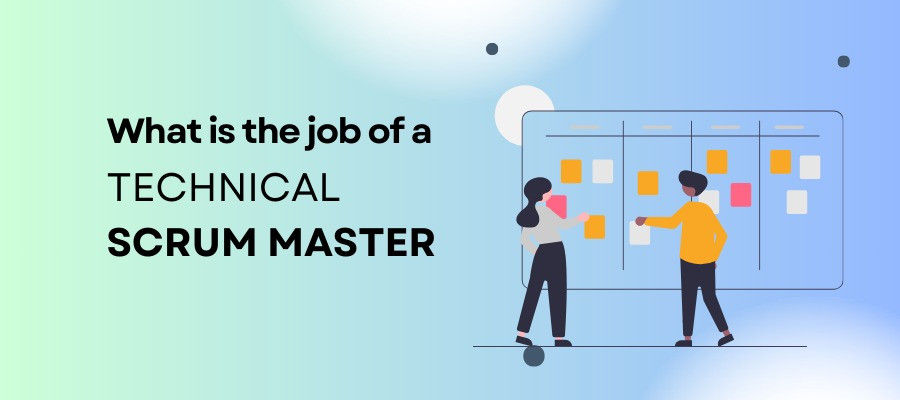What is the job of a technical Scrum Master?

If you're contemplating a career as a Scrum Master or already fulfilling that role, you may be questioning whether technical experience is essential for success. This is particularly relevant if your organization has recently adopted Scrum methodologies.
The simple answer is "No," but let's explore the details to understand why having technical expertise is not necessary for this important role.
Technical Scrum Master – A Unique Perspective
The term "Technical Scrum Master" isn't an official classification found in the Scrum Guide. It's a label applied to Scrum Masters who transition into the role after working as engineers or testers in product development for some years. The primary distinction between technical and non-technical Scrum Masters lies in their understanding of the product at a deep technical level.
Technical Scrum Masters can engage the team with technical questions to aid problem-solving. However, this approach should be used cautiously. It's tempting for technical individuals to immerse themselves in technical conversations or even suggest tools and solutions. Such actions blur the line between their responsibilities and could lead to conflicts of interest, eroding trust within the team.
Additionally, technical Scrum Masters might occasionally step into tasks that should not be their domain, such as writing code or creating prototypes. While some organizations may desire Scrum Masters with technical capabilities, this is more of a customized practice than a rule. When a technical professional transitions to a Scrum Master role, it indicates a desire to emphasize "soft skills" over technical expertise.
What is the job of a technical Scrum Master?
The job of a Technical Scrum Master combines the responsibilities of a defined Scrum Master with a deeper understanding of technical aspects related to software development or other technical domains. Here's a breakdown of the key responsibilities and roles a Technical Scrum Master typically fulfills:
- Facilitating Scrum Events: Like any Scrum Master, a TSM facilitates Scrum events such as Sprint Planning, Daily Scrum, Sprint Review, and Sprint Retrospective. They ensure these meetings run smoothly, stay focused, and adhere to the time limits.
- Removing Impediments: TSMs identify and address impediments that hinder the Developers' progress. They work to resolve issues, whether they are technical or process-related, and help the team maintain a smooth workflow.
- Coaching and Mentoring: TSMs provide guidance and Coaching to the development team on Agile and Scrum practices. They ensure the team understands and follows Agile principles and Scrum rules.
- Technical Expertise: TSMs possess a strong technical background, which allows them to understand the technical challenges the team faces. They can empathize with the developers' perspective and assist in problem-solving, especially when technical issues arise.
- Collaboration: TSMs foster collaboration between cross-functional teams, such as development, testing, and operations. They facilitate communication and cooperation to achieve a common goal.
- Product Owner Collaboration: TSMs work closely with the Product Owner to ensure a clear understanding of product requirements and priorities. They help the Product Owner create and maintain a well-refined Product Backlog.
A Technical Scrum Master (TSM) can serve multiple crucial roles, from being a servant leader to a technical facilitator:
- Team Coach: While not a team member, a Scrum Master can act as a coach, aiding in successful Agile adoption and maximizing its benefits.
- Technical Perspective: A TSM can engage with software development activities from a technical standpoint, enhancing the team's comprehension.
- Empathy: Understanding engineers' viewpoints and collaborating effectively with a Product Owner.
- Issue Triage: Addressing first-level issues before they reach the engineering management layers.
- Facilitator: Organizing meetings between technical teams to solve complex problems.
Having basic technical skills allows the Scrum Master to speak the same language as Developers, fostering credibility with senior management.
Issues with a Technical Scrum Master
However, having a Scrum Master who is overly technical comes with potential drawbacks:
- Role Confusion: Excessive technical knowledge might blur the boundaries between the Scrum Master's role and that of the engineering team.
- Biases and Interference: A TSM may bring preconceived biases and ideas that interfere with the roles of both the development team and the Product Owner. This can undermine team morale and cohesion.
- Overstepping Boundaries: A TSM might inadvertently take on responsibilities that don't align with the Scrum Master role, such as guiding the team on technology choices or project management.
Both the team and the organization should understand when a Technical Scrum Master is extending beyond the scope of their position.
Conclusions
Being a Scrum Master in a technical role? According to the Scrum Guide, current or aspiring Scrum Masters need not worry about being engineers or having extensive technical skills. However, a solid understanding of the Agile practices and a general grasp of industry technicalities are essential for success in this role.
Ultimately, the key lies in finding the right balance between one's background and the Scrum Master's responsibilities. Keep in mind that no two Scrum Masters are identical, and if you ever feel the need for technical skills, don't hesitate to seek guidance from a fellow technical Scrum Master. Just as you guide your team, remember to guide yourself in navigating the various challenges of your daily work.
And there you have it – a comprehensive understanding of the role of a Technical Scrum Master, where technical skills are beneficial but not mandatory. Embrace your unique strengths and adapt to the needs of your team and organization, and you'll excel in this essential Agile role.
Ref Link:




